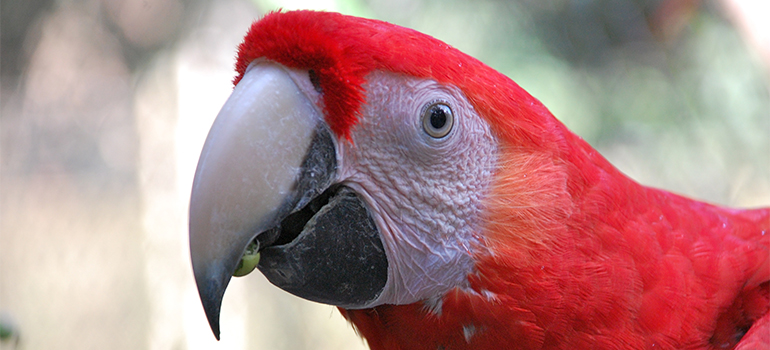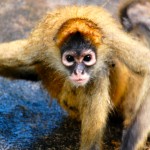Study of market for wild species uncovers disturbing incidents of capture, smuggling and auction
His name is Stevie. An orphan who is a long way from home, he has already been through a lot. So why would Rosemary Collard spray him in the face with water?
Stevie is a juvenile spider monkey living at Asociación de Rescate y Conservación de Vida Silvestre (ARCAS), a wildlife rehabilitation centre in northern Guatemala where Collard, a graduate student in UBC’s Dept. of Geography, conducted some of the fieldwork for her doctoral degree.
Part of her job at ARCAS involved spraying animals with water to sever their bonds to humans, giving them their best chance to re-enter their natural habitat. It’s a difficult task for an animal lover like Collard, but one that is necessary to reverse the damage caused by the illegal trade of exotic animals.
Collard’s work looks at the commodification of wildlife, focusing on animals traded as exotic pets. Part of her study was recently published in the Annals of the Association of American Geographers.
During her research, she heard detailed accounts of capture strategies in Mexico and Belize. She also had to steel herself not to react as she watched endangered species being sold at auctions in the U.S. There she saw trade in large snakes, zebras, camels, baboons and even a giraffe.
Billion-dollar underground economy
Illegally traded wildlife earns dealers about $10 billion annually and is the third-largest illegal industry worldwide after arms and drug dealing, according to the Humane Society of the United States.
Exotic animals commonly found in pet stores, such as some bearded dragons, parrots, iguanas and turtles may have been illegally imported. Smuggling incidents have also involved drugged baby leopards, bears, monkeys and panthers crammed into suitcases on airplanes.
Endangered and threatened species are protected by the Convention on International Trade in Endangered Species of Wild Fauna and Flora (CITES). However, regulations are poorly enforced and business can be lucrative– a scarlet macaw can fetch as much as $10,000 US. False documentation is rife and border officials are inadequately trained to identify endangered species.
In addition, species bans can be counterproductive, driving up demand and boosting profits for traffickers. The U.S. is the top importer of live exotic animals, closely followed by Japan and the U.K. China is often called the worst offender in animal trade but most of its imports are animal parts rather than live animals.
Back into the wild
ARCAS houses animals that have been seized by wildlife trade enforcement authorities. Workers at the centre aim to return them to health and hopefully to the wild. As long as Stevie trusts people he has no chance of going home to the jungle – that’s why he gets spritzed every time he engages with centre staff.
In addition to spider and howler monkeys, Collard spent a month with ARCAS’ snakes, wild cats such as ocelots and margays, crocodiles, snakes, tortoises, macaws and baby parrots.
The spritzing is part of what Collard terms “misanthropic practices,” actions that make animals fear and distrust humans. These include being distant and stern and not speaking around parrots because learned speech might interfere with wild calls necessary for survival. Aversion tactics for monkeys are gradually escalated to include flares, firecrackers and electric fences.
“The fieldwork was very tough emotionally,” says Collard.
It’s uncertain what policy or enforcement changes could best curb the illegal trade of wildlife. But according to Collard, any solution has to be rooted in the idea that people can no longer treat animals as inferiors and commodities.
“We buy these creatures for novelty and status but at what cost?”
As for Stevie, it appears that the tough love has paid off. He is now the dominant monkey in his troop and is set to be released into the Guatemala forest sometime next year.
Collard graduated from UBC this year and will soon be an assistant professor of Geography at Concordia University. To read her dissertation, visit https://circle.ubc.ca/handle/2429/45619.

